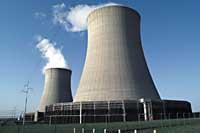Natural nuclear reactor
Alex Meshi and his colleagues at the University of Washington have discovered clues about the activity of a natural Christmas nuclear reactor. It is said that the activity occurred two billion years ago and was cyclical.

There were uranium veins on the rocks of a place called Oklo. Uranium tended to decomposition, but they believe that the water that penetrated the cracks of the rock caused the reaction to occur cyclically: the heat produced in the reaction evaporated the water, and when the reaction was completely dried it stopped; when the rock was filled with water it was put into operation.
In nuclear reactors, xenon is produced, among others, and is emitted into the atmosphere. Xenon was also produced in that natural nuclear reactor, but it was trapped in the aluminum phosphate of nearby rocks. By imitating it, they can develop some xenon capture technique in current reactors.





